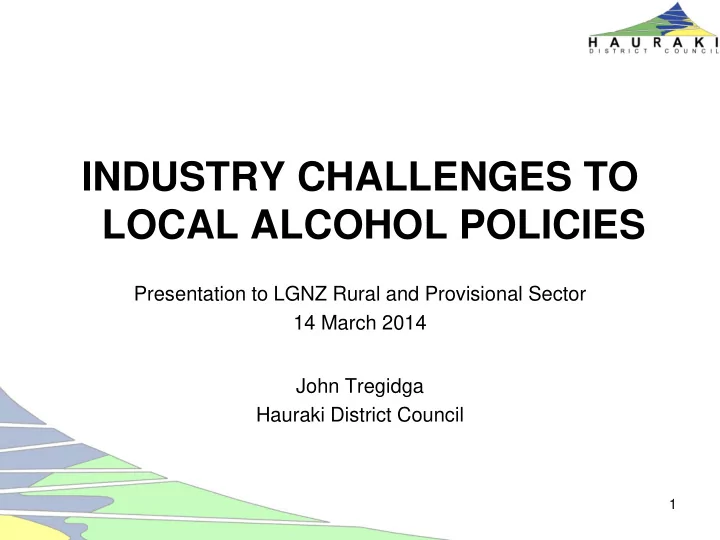

INDUSTRY CHALLENGES TO LOCAL ALCOHOL POLICIES Presentation to LGNZ Rural and Provisional Sector 14 March 2014 John Tregidga Hauraki District Council 1
Background to Alcohol Reforms The Intent of the 2010 Alcohol Reforms was to: Reduce the harm caused by excessive alcohol use, particularly among young people Reduce heavy episodic drinking Reduce costs borne by Government sectors such as health and police Achieve the above points without impacting unduly on the economy and moderate drinkers Regulatory Impact Statement (Ministry of Justice) 2
Sale and Supply of Alcohol Act, 2012 The Object of the Act is that; ‘the sale, supply and consumption of alcohol should be undertaken safely and responsibly and the harm caused by the excessive or inappropriate consumption of alcohol should be minimised’. Harm is defined very widely and includes any crime, damage, death, disease, disorderly behaviour, illness or injury to individuals or the community. The Act established tools to reduce harm including; Greater liability for serving intoxicated people and/or supplying minors Establishing District Licensing Committees Greater restrictions on certain premises holding multiple liquor licences Empowering Local Government to develop Local Alcohol Policies 3
Local Alcohol Policies The purpose of LAPs is to put in place a reasonable new system of control over the sale and supply of alcohol for the benefit of the community as a whole in order to minimise harm. Policies that may be included in an LAP are: Location of licensed premises; Issuing of further licences; Maximum trading hours; The issue of licences subject to discretionary conditions; One-way door restrictions. A LAP can apply differently to different parts of a District. 4
Hauraki District Council Policy Development LAP Working Party – Mayor and 4 Councillors LAP survey completed by 439 residents Meetings held with local Police District Police Officers undertook Police survey Key stakeholders and Community Discussion group Regular liaison with Population Health and Police Alcohol Reduction Officer Research Document - analysis of required information Council must have regard to when developing a LAP 5
Hauraki District Council LAP Draft LAP proposed: Off-licensed trading hours 9am to 9pm the same day On-licensed trading hours 9am to 1am the following day Compulsory one-way door restriction from midnight to 1am 50 metre off- licence restriction from ‘sensitive sites’ – schools, playgrounds and pre-schools Off-licence density caps in three main towns Provisional LAP changes: Off-licensed trading hours of 7am to 9pm On-licensed trading hours of 7am to 1am the following day One-way door restriction as a discretionary condition 6
Support for our LAP The Hauraki LAP was developed in collaboration with the community There was extensive pre-consultation undertaken with Population Health and the Police 24 written submissions received to the draft policy The majority of submitters supported the Policy including; Police and Population Health Grey Power The Cancer Society Hauraki Family Violence Intervention Network Health Promotion Agency Paeroa Community support Trust Various community groups and individuals 7
INDUSTRY CHALLENGES An appeal can be lodged against an element of an LAP if it is believed to be unreasonable in light of the object of the Act. Progressive Enterprises appealed the LAP want national default trading hours of 7am to 11pm 7 days a week Progressive argue that Council has not adequately demonstrated that there is harm caused by selling alcohol between 9pm and 11pm and The data is not relevant anyway as the provisions in the new Act mean the same “level of alcohol related harm rate may not be present” Progressive have also appealed other Councils on similar grounds 8
Conclusion Local communities know the “Harm” that alcohol causes and this harm should be allowed to be addressed by “Local” Alcohol Policies Hauraki has overwhelming support from Police, Population Health and our community for our “Local” Alcohol Policy According to Progressive defending any trading hours that differ from the national default trading hours is impossible Resolution: THAT the territorial authority members of the Rural and Provincial Sectors of Local Government New Zealand believe that it is both paramount and essential to achieving the objectives of the Sale and Supply of Alcohol Act 2012, that the reasonable views and preferences of a community be incorporated into a local alcohol policy (as empowered by Section 75 of that Act) 9
Recommend
More recommend